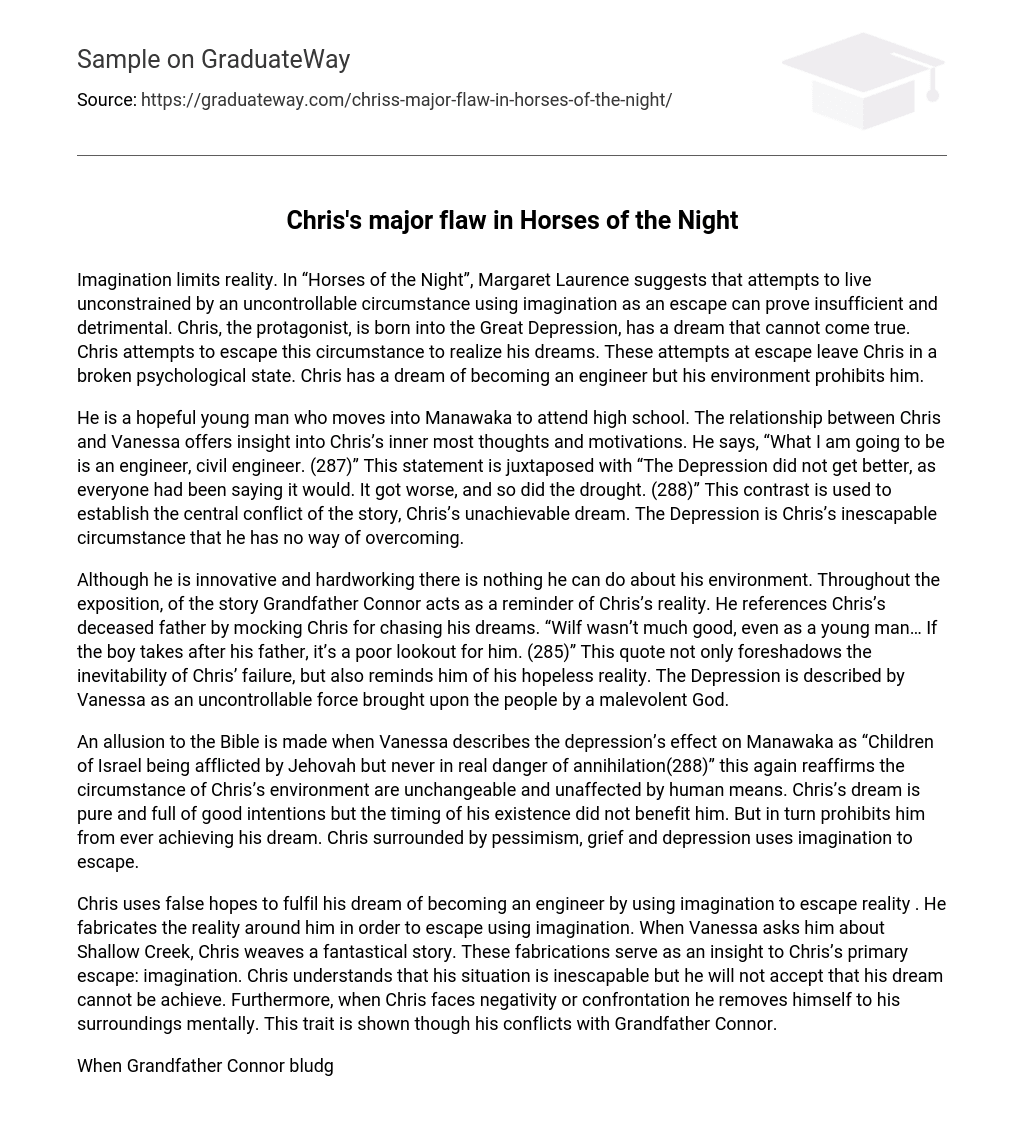In “Horses of the Night”, Margaret Laurence explores the idea that relying on imagination to escape uncontrollable circumstances can be detrimental. The protagonist, Chris, is born during the Great Depression and has a dream that is impossible to achieve. Despite his attempts to escape his circumstances and pursue his dreams, Chris is left psychologically damaged. His aspiration of becoming an engineer is hindered by his environment.
Chris, a hopeful young man, has recently moved to Manawaka for high school. His relationship with Vanessa provides insight into his thoughts and motivations. He declares that he aspires to become a civil engineer, stating, “What I am going to be is an engineer, civil engineer. (287).” However, this aspiration is contrasted with the worsening conditions of the Depression and drought, as he reflects, “The Depression did not get better… It got worse, and so did the drought. (288).” Through this contrast, the central conflict of the story is established: Chris’s unattainable dream. The Depression serves as an inescapable circumstance that he has no means of overcoming.
Despite his innovation and hard work, Chris is unable to change his environment. Throughout the exposition, Grandfather Connor serves as a constant reminder of Chris’s circumstances. By mocking Chris for pursuing his dreams, he brings up memories of Chris’s deceased father. “Wilf wasn’t much good, even as a young man… If the boy takes after his father, it’s a poor lookout for him. (285)” This quote not only suggests that Chris is destined to fail, but also reinforces the hopelessness of his reality. Vanessa describes the Depression as a relentless force imposed on the people by a malevolent God.
Vanessa makes an allusion to the Bible to describe the impact of depression on Manawaka, stating that it is similar to the Children of Israel being afflicted by Jehovah but never in real danger of annihilation (288). This reinforces the idea that Chris’s environment is unchangeable and not influenced by human efforts. Despite having pure intentions in his dream, Chris’s timing did not work in his favor, preventing him from ever achieving it. Surrounded by pessimism, grief, and depression, Chris resorts to imagination as an escape.
Chris employs the power of imagination to fulfill his dream of becoming an engineer by relying on false hopes and fabricating his reality. When questioned about Shallow Creek by Vanessa, Chris skillfully weaves an extravagant tale, using his imagination as his primary means of escape. While fully aware that his current situation may be inescapable, Chris refuses to accept that his dream is unattainable. Moreover, when confronted with negativity or confrontation, Chris mentally withdraws himself from his surroundings. This characteristic is exemplified in his conflicts with Grandfather Connor.
When Grandfather Connor verbally attacks Chris, Vanessa observes that he showed no emotional response and seemed to be mentally absent. He neither defended himself nor apologized. Rather, he appeared to escape into his imagination whenever confronted with resistance or reality. By disregarding the negative aspects of his life, he fails to grasp the vulnerability of his unattainable goal. The evening before his departure, Chris states that anyone can accomplish anything if they truly put their mind to it.
Chris’s actions hinder the fulfillment of his dream, while his habit of evading an undesirable situation is causing him to lose touch with reality. Vanessa, on the other hand, initially believed in all of Chris’s far-fetched tales and unreachable dreams, but as the story unfolds and the devastating impact of the great depression becomes more apparent, she becomes less innocent to the destructive truth of their circumstances. However, Chris remains relatively positive about his situation.
Chris’s only companion on his journey to achieve his dream is his imaginative false hopes. These hopes drive him to keep believing and focus on the end goal, motivating him to persist and work hard. Despite being innovative in his business ventures, Chris cannot overcome the overwhelming circumstances of the great depression. The reality of the situation is that the depression is an unstoppable force that will inevitably crush Chris’s dreams.
Despite Chris’s persistent efforts to achieve his dream, he cannot avoid the harsh reality of his circumstances. While imagination initially motivates Chris to escape from reality, it ultimately ruins both his dream and his sanity. Chris becomes cynical as he realizes that reality has crushed his once hopeful theory. He wonders, “To believe in a God who is brutal. What else could He be?” (298). Despite his best efforts, Chris finds that his circumstances or the will of God are preventing him from reaching his goal. For Chris, there is nothing more disheartening than persevering to attain his dream, only to lose it all due to an uncontrollable force. When reflecting on the war, Chris questions, “What kind of God would pull a trick like that?” (298). Although he understands the horrors of war, he feels compelled to escape his current situation in Shallow Creek. Ironically, Chris attempts to escape the reality of his circumstances by facing the reality of war. However, no matter how many times he escapes, he cannot physically evade the realities of war. As a result, Chris returns home insane and is admitted to a hospital.
This suggests that Chris, in an attempt to avoid reality, becomes delusional. He never confronts the truth that surrounds him, making it impossible to ignore. In the past, he could simply isolate himself from the world, but during war, there is no refuge other than madness. Chris’s endeavors to evade his situation, whether through imagination or false optimism, are both ineffective and fatal. Dreams must be realistic in order to be realized, as reality will overwhelm mere imagination.





